 Petzlover
Petzlover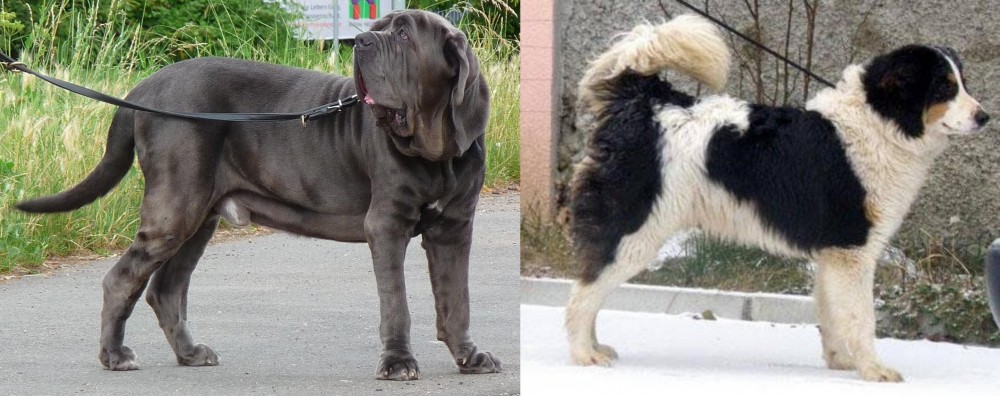 Neapolitan Mastiff is originated from Italy but Tornjak is originated from Croatia. Both Neapolitan Mastiff and Tornjak are having almost same height. Neapolitan Mastiff may weigh 29 kg / 64 pounds more than Tornjak. Neapolitan Mastiff may live 3 years less than Tornjak. Neapolitan Mastiff may have more litter size than Tornjak. Both Neapolitan Mastiff and Tornjak requires Moderate Maintenance.
Neapolitan Mastiff is originated from Italy but Tornjak is originated from Croatia. Both Neapolitan Mastiff and Tornjak are having almost same height. Neapolitan Mastiff may weigh 29 kg / 64 pounds more than Tornjak. Neapolitan Mastiff may live 3 years less than Tornjak. Neapolitan Mastiff may have more litter size than Tornjak. Both Neapolitan Mastiff and Tornjak requires Moderate Maintenance.
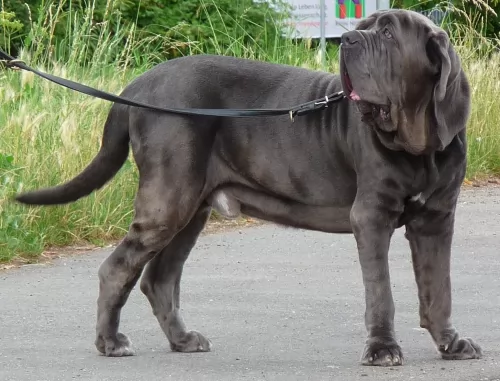 An ancient breed, the Neapolitan Mastiffs are massive dogs with a history of protecting their family and their property. The breed has deep rooted protective instincts and they are very frightening in appearance. The Neapolitan is of the Molosser group of dogs, all of whom probably came from the same line. It is known that all the mastiffs in Europe are descendants of the Tibetan Mastiff. The Tibetan Mastiff is considered the most ancient of all canines.
An ancient breed, the Neapolitan Mastiffs are massive dogs with a history of protecting their family and their property. The breed has deep rooted protective instincts and they are very frightening in appearance. The Neapolitan is of the Molosser group of dogs, all of whom probably came from the same line. It is known that all the mastiffs in Europe are descendants of the Tibetan Mastiff. The Tibetan Mastiff is considered the most ancient of all canines.
The Asian Mastiffs came from India to Greece around 300 BC with Alexander the Great. Then the breed was brought to the Romans by the Greeks and then introduced them in their circus in fights. Another possibility is that around 500 BC the mastiffs came to Britain from the Phoenicians. Either way the Roman Molossus is the ancestor of the Neapolitan Mastiff.
The Romans crossed the breed with the English Mastiff around 55 BC and developed a premiere war dog that was called a Mastini.
The breed eventually became extinct in Europe with the exception of Campania. The breed was recognized in 1946 with the standard accepted in 1949. However, it is believed that the Neapolitan Mastiff has been continuously present in Campania for over two thousand years. The breed was initially developed as war dogs and for the Roman coliseum spectacles.
In 1946 Dr. Piero Scanziani established a program to breed them in Italy. He wrote the breed standard in 1949.
Today the Neo is a farm dog, an army dog, a police dog and a guard dog. They were shown in Italy for the first time in 1946 but only in 2004 was the breed recognized by the American Kennel Club (AKC). It was 1973 when the Neapolitan Mastiff Club of America was born and 1996 when the standard was approved by the AKC. They are still a rare breed in the United States.
 Known also as the Bosnian and Herzegovinian, the Tornjak dog hails from Croatia and Bosnia and is a large mountain sheepdog.
Known also as the Bosnian and Herzegovinian, the Tornjak dog hails from Croatia and Bosnia and is a large mountain sheepdog.
It is thought that this protector of livestock dog has been bred from the Tibetan Mastiff. He is an ancient breed because there are records of its existence coming as far back as the 11th century.
As a working dog, his role of guarding sheep became less and the dog’s numbers diminished. It was during the 1970s that the breed was revived.
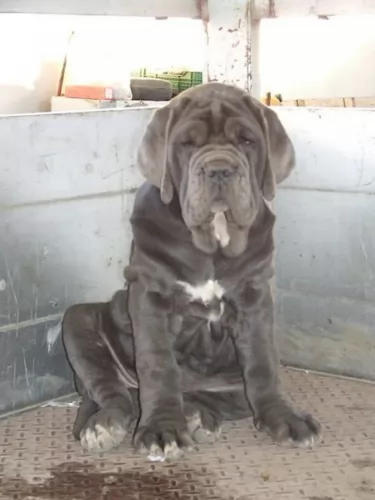 The Neapolitan Mastiff is a massive dog , so powerful and very intimidating in his looks. With an incredibly large head and hanging folds and wrinkles, the Neo is an impressive animal. His inner nobility and dignity is evident in his stance and the way he holds himself. He is relaxed, calm, quiet yet imposing none the less. His coat is dark whether black, tawny, gray or mahogany. He is muscular beyond imagination. The Neo is 10-15% longer than he is tall.
The Neapolitan Mastiff is a massive dog , so powerful and very intimidating in his looks. With an incredibly large head and hanging folds and wrinkles, the Neo is an impressive animal. His inner nobility and dignity is evident in his stance and the way he holds himself. He is relaxed, calm, quiet yet imposing none the less. His coat is dark whether black, tawny, gray or mahogany. He is muscular beyond imagination. The Neo is 10-15% longer than he is tall.
On his massive head his eyes are deep set and covered by his eye lids that droop. His eyes are blue as puppies then dark and coordinated with his coat. and his nose is large and the color of his coat. Ears are natural or can be cropped, and they carry their tail straight and curving back. The Neo has round paws and arched toes.
 This is a large, strong dog, standing at between 58 and 72cm in height and weighing between 28 and 50kg. He has a long, thick coat which has always protected him from the harsh winters of the countries he comes from.
This is a large, strong dog, standing at between 58 and 72cm in height and weighing between 28 and 50kg. He has a long, thick coat which has always protected him from the harsh winters of the countries he comes from.
Common colors for the coat are mainly white with tan, brown, grey or black markings.
The Tornjak is a beautiful dog and also calm by nature, well balanced, intelligent and self- confident. His calm nature doesn’t stop him from being a good watchdog though as he is also alert and brave.
He is more than willing to please his owner and is able to be trained and socialized with ease.
He is a social dog and just loves spending time with hs human family. Therefore efforts should be made not to leave him alone for long periods of time. He forms strong bonds with them and is loving and devoted. Because of his size and energy he won’t suit life in the city on a small property but will be better suited to life in the countryside.
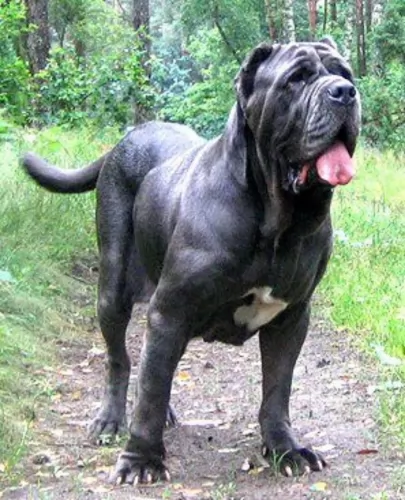 Older children in their family. No toddlers or strangers.
Older children in their family. No toddlers or strangers.
Protective yet quiet, calm, relaxed
No they won’t adapt well to apartment living or to strangers.
They are intelligent and trainable but must be socialized and know the human is the alpha or they will take over.
 With their human family, they become attached and loyal, not wanting to be separated from anyone for too long. Give him the care this beautiful dog deserves and he'll make you a splendid pet and companion.
With their human family, they become attached and loyal, not wanting to be separated from anyone for too long. Give him the care this beautiful dog deserves and he'll make you a splendid pet and companion.
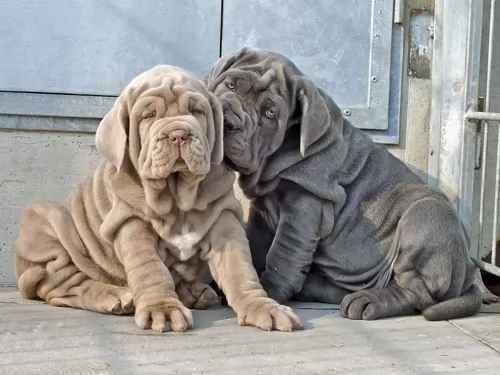 The Neapolitan Mastiff is prone to many of the same issues as any massive, extra large breed. The most common of these is Cherry Eye.
The Neapolitan Mastiff is prone to many of the same issues as any massive, extra large breed. The most common of these is Cherry Eye.
 Most dogs face one or two health challenges in their lives, but most Tornjaks are healthy and won’t easily get sick.
Most dogs face one or two health challenges in their lives, but most Tornjaks are healthy and won’t easily get sick.
They’re large dogs so they typically don’t live as long as small dogs. They can live to be between 10 and 12 years of age.
This is a dislocation of the kneecap, caused by an injury or it can be present at birth. It can cause pain and a limp.
This is a joint condition that is more often seen in large dogs. The ill-fitting joint rubs and chafes, and osteoarthritis and more pain is the result.
You will have to speak to your vet about relieving the pain for your dog and making him more comfortable. Don’t think hip dysplasia is something only old dogs get – it can develop with young dogs – even puppies. Your veterinarian will examine your pet and suggest different medical and surgical options.
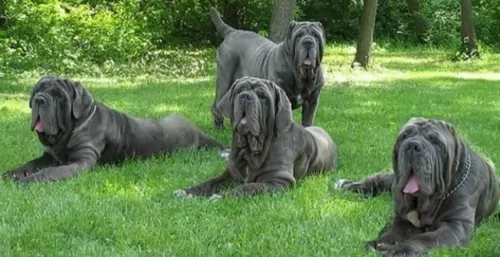 Neapolitans grow fast and so don’t overfeed when they are young. Lower protein and higher fat content.
Neapolitans grow fast and so don’t overfeed when they are young. Lower protein and higher fat content.
Don’t overfeed the adult as they can become obese.
This big hearty breed needs exercise but not too much. They overheat easily. The puppy will push himself, so you have to make sure he doesn’t over do it. No tug of war games. They need a long walk twice every day.
 The Tornjak needs exercise every day to keep him fit and happy. He will love it when you take down his leash for his daily walk. He is a social dog and will want to be involved with all your activities. He gets on well with other dogs too.
The Tornjak needs exercise every day to keep him fit and happy. He will love it when you take down his leash for his daily walk. He is a social dog and will want to be involved with all your activities. He gets on well with other dogs too.
The Tornjak will require quite a bit of grooming because the hair is fairly long and it sheds. Some dog owners have the hair cut by a professional groomer. Regular brushing certainly helps to reduce lots of dog hair flying around.
The insides of his ears need to be checked for signs of redness as well as the eyes. The eyes should be checked for pus and redness. Occasional dog nail trimming will also be required.
Provide your Tornjak with top quality food. If you feed him with one of the commercially manufactured foods, make sure it is one of the better brands. The inferior brands are filled with bad ingredients that can actually make a dog sick.
Try to include some home-made food which can be added to the dry kibble twice a week as a treat. Avoid human foods such as chocolates, grapes, onions, peanuts and chips as these can give him stomach pain and more vet bills for you.
Stick to wholesome, simple foods such as boiled chicken, brown rice or pasta and spinach, sweet potatoes and carrots. Your Tornjak will love it and it will ensure he has bright eyes ad a wagging tail. Never leave him without a constant supply of fresh, cool water.